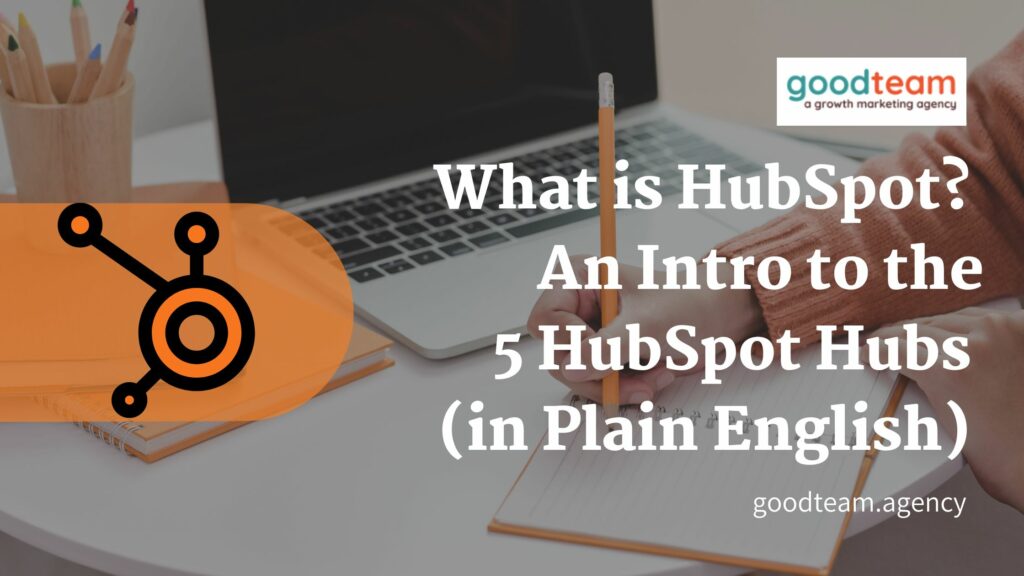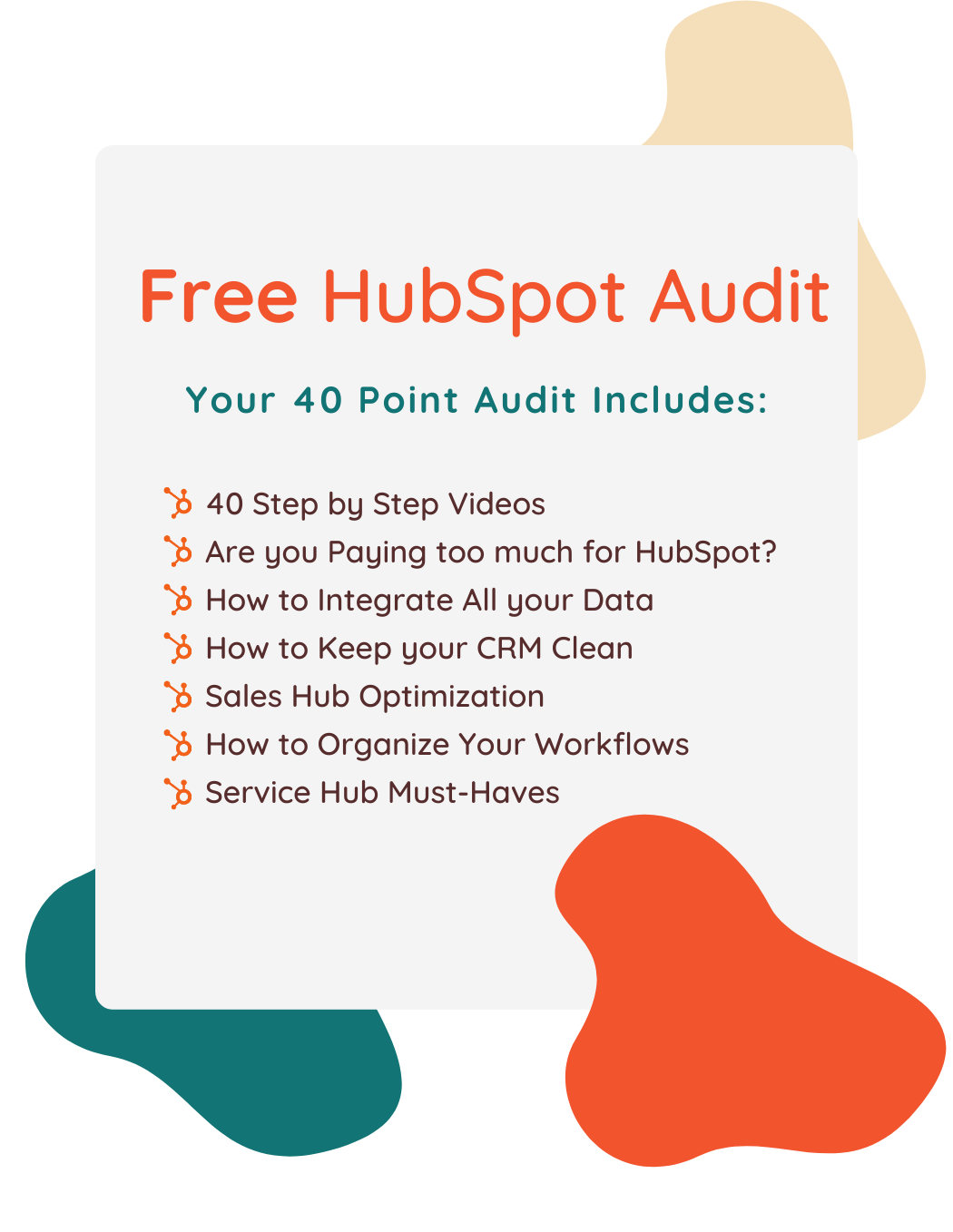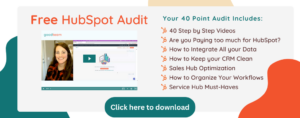What is HubSpot? An Intro to the 5 HubSpot Hubs (in Plain English)

Written by
Good Team
Created on
May 3, 2022
What is HubSpot?
If you’ve ever researched how to grow your web traffic, you’ve probably stumbled across HubSpot.
But even after some research and stumbling over popular buzzwords, are you still unsure about what HubSpot is, what it does, and how it will help grow your business? You’re not alone.
HubSpot’s the leading company in the digital marketing scene, famous for its web content, certification courses, and most importantly, it’s CRM software.
And while the company might be easy to explain, understanding what its software is and does is a little more complicated. There’s a lot of industry jargon when trying to explain HubSpot’s software.
For instance, here’s an example of trying to explain the CRM platform:
The HubSpot CRM platform is an all-in-one software system used to drive inbound marketing, convert leads, increase ROI, boost productivity, and optimize your website.
See what I mean?
Popular buzzwords like “inbound,” “CRM,” and “ROI” can intimidate even experienced marketers.
But as a HubSpot partner, we work with HubSpot every day and help our clients grow their businesses by getting the most out of the platform.
We hope that this guide helps reduce the steep learning curve and helps you decide if it’s right for your business.
Here’s our guide to HubSpot in plain English: what it is, what it does, and how it can grow your business.
What is HubSpot?
High level, HubSpot is a cloud-based CRM software that provides seamless connectivity between marketing and sales teams, implements effective sales enablement, boosts your ROI, and enhances your inbound marketing strategy.
But that explanation is a little too “buzzwordy.”
So, simply put, HubSpot is a marketing and sales platform that helps companies grow traffic, convert leads, close deals, and turn customers into promoters.
It’s a place where multiple software and platforms come together under one roof- creating an all-in-one complete CRM (customer relationship management) system.
More specifically, HubSpot’s CRM offers software and tools for marketing, sales, service, and operations teams. So marketing and sales departments can manage everything in one place, together.
There are a few ways your company could use HubSpot’s tools.
For example, by automating workflows to the sales pipeline, your sales and marketing teams work together seamlessly without having to constantly message each other about confusing spreadsheets.
Or, by hosting your social media on HubSpot, both your marketing team and sales team would have access to social media data, clicks, and conversions.
That way if you’re promoting a special for your company, both teams would be able to see which channels are delivering the most value.
Let’s unpack all the different tools and features you could utilize from HubSpot.
HubSpot’s Tools and Features
There are five main parts to what HubSpot has to offer:
- Marketing Hub (marketing tools like SEMRush and MailChimp)
- HubSpot CRM (sales and pipeline management tools like Salesforce)
- HubSpot CMS (build websites like you would run on WordPress or Wix)
- Service Hub (customer support management like Trello)
- Operations Hub (in-depth data sync like Zapier)
There are free versions of both the Marketing Hub and HubSpot CRM, so you can try them before buying.
And what’s nice about this system is that even though each Hub is a separate subscription service, they all work together. So if your company would only utilize two or three parts of the different tools, you don’t have to pay for all of the options.
Here is a breakdown of each of the four “hubs” below so you can decide which are right for you:
HubSpot Marketing Hub
What is HubSpot Marketing Hub?
Increase your traffic and conversions with a list of marketing tools that allow top-tier content creation for your blogs, email, social media, and website. This Hub provides effortless metric tracking and reporting of all the data you could need.
It’s no surprise that the HubSpot Marketing Hub is extremely popular because it brings all of the marketing channels together in one place. So instead of having your individual social channels (Twitter, LinkedIn, Facebook, etc.), paid advertising, and content marketing campaigns in separate places- they are all under one roof.
And by having them in one place, not only are you streamlining processes, but you’re also making your marketing data accessible to your entire team.
As a HubSpot partner, we use the Marketing Hub daily. We use it for our clients’ blogs, email automation, and forms, and it has made a huge impact on our clients’ success and marketing efforts.
But you’re not here to talk about our business; you’re here to learn what HubSpot can do for you. So, let’s get into the nitty-gritty of the tools and features of the Marketing Hub.
- Social Media
With the social media tool, you can manage all of your accounts (LinkedIn, Facebook, Twitter, etc.) from one place by creating and scheduling posts from one calendar.
What’s most appealing about having all these things in one place is that it’s a huge time-saver. So instead of logging into 3, 4, or 5 different accounts, you only have to log into one.
And instead of creating a calendar on multiple spreadsheets, you can use the calendar tool once to schedule posts automatically.
It also eliminates the need for other services like Hootsuite.
And you can quickly see which channels are driving the most traffic by using their built-in analytics tool.
With the analytics tool, all your data is in one place to easily compare each channel and figure out your return on investment (ROI).
And as any marketing manager knows, justifying the need for social media isn’t always easy.
But by using the analytics tool, you can see when social media traffic converts. Which gives you concrete evidence of which channels are worth your company’s social media spend.
- PPC Advertising
The Ads tool is similar to the organic tool. It brings all of the paid media channels (Facebook, Google Ads, etc.) under one roof and makes it easy to measure your success.
But one advantage to using this tool compared to others is that it shows you how many initial
clicks turned into conversions.
- Landing Pages
Creating a destination for people to land on is an essential best practice. Whether that be a limited-time offer or specific services that your company provides. Using HubSpot’s landing page templates lets you create beautiful, customized landing pages for each new campaign quickly and easily.
- CTAs (Calls to Action)
Creating compelling content means meeting people where they are and guiding them to take action with a compelling call to action.
What’s unique about HubSpot’s CTA tool is that with smart CTAs, you can tailor the offer depending on the visitor’s previous actions. So you can show the most relevant content, depending on where they are on the buyer’s journey.
- Email Marketing & Marketing Automation
Imagine never having to transfer your mailing list from your CRM to your email marketing software and then going back and deleting bad emails and unsubscribes again.
What would your work life look like if you had an all-in-one system where you could create lists, send emails, and understand the results?
Not only that but what if you could save time by automating email follow-ups, customized depending on previous actions (like watching a video or filling out a form).
Enter HubSpot’s Workflows.
- Dashboards
Dashboards are a useful way to present data that you want to know right away. You can customize them to help you build a clear picture of how well your various marketing campaigns are working together.
Not only can you customize the data, but you can also customize who has access to the reports.
For example, if your marketing team needs a high-level report of cost per conversation for paid search campaigns and your sales team will only be overwhelmed by that information. You can set it, so only your marketing team has access.
It’s all about giving access to helpful information to the people that need it to effectively do their jobs.
And while there are plenty of dashboard products on the market, HubSpot’s user-friendly platform sets it apart from the competition.
- Forms
And last but not least, HubSpot’s form builder. The form builder is a truly powerful tool that lets you create aesthetically pleasing, customizable forms quickly.
Which means that you can add fields that are actually relevant to your business. And after the forms are filled out, that data can be automatically passed to the HubSpot CRM (if that’s something you’re using).
Why is that a big deal?
First, because it’s an automated process, your sales and marketing team wouldn’t have to pass that information back and forth.
Which means they save time and nothing falls through the cracks.
It also gives you the chance to know exactly which forms are working the best; so you can fully understand what it takes to reach your target audience.
Big. Stuff.
HubSpot Sales Hub
Next, the HubSpot Sales Hub will help your sales department close more sales and stay organized with templates, email tracking, scheduling, and more.
And out of the Sales Hub, the most essential tool is the HubSpot CRM.
- HubSpot CRM
The HubSpot CRM tool has the power to transform your business. Especially if you’re a company that stores information about possible leads on spreadsheets or google docs.
For example, your sales team could share a document about past contacts with a possible lead while your marketing team could have another document of leads generated from email marketing, and another department could track possible areas of opportunity.
By combining all the data between those documents, your company will not only save time but also improve communication between teams.
Basically, the HubSpot CRM is the ultimate launchpad for all branches of your business.
Employees at all levels and all branches will benefit from storing every company contact and lead in one place and every department having access to the stored leads through the same portal.
Originally HubSpot CRM was a marketing tool to store leads before sending them to the sales team. But today, the platform has evolved into a more robust, efficient and success-growing masterpiece.
What makes HubSpot’s CRM tool unique:
- Anyone can log in and see where your leads are coming from.
- Sales reps know what’s going on by tracking leads and conversions.
- No one falls through the cracks with automated Chatbots.
- You’ll save time and money by streamlining your sales process with a sales pipeline.
- You’ll get feedback with customer surveys.
- Deals Pipeline
The deals pipeline is a tool that will allow your marketing and sales team to keep track of your contacts’ progress as they move through the sales process.
Although this might not seem like a big deal, having your deals pipeline established will help you and your team visualize how many people you have moving through the pipeline and how likely they are to make it to the end. You can also set up automated workflows to help you save time on specific tasks.
- Automated Workflows
The automated workflows tool gives you the freedom to add contacts to a variety of email automations depending on how they engage with your content, or sales department.
For example, you could set up an automated workflow to send an email to everyone that fills out a form on your homepage. Or you could add people who have recently gone cold to a seven email sequence designed to re-engage prospective clients.
Whatever your needs, you can 100% customize your automated workflows to work for you.
HubSpot CMS
Content Management System or CMS is HubSpot’s top-notch system for creating and publishing content to your website (similar to WordPress or Wix).
What’s unique about HubSpot is its complete website hosting, top-tier security, speed, drag and drop editing, and the best of data integration.
It’s also unique in its approach to content management by focusing on topic clusters that are created to help you grow your website traffic.
HubSpot’s CMS is used by advanced marketers and newbies alike. With its user-friendly editing abilities and ability to add pages without breaking links, who wouldn’t want that?
HubSpot Service Hub
If your business interacts with customers and offers support, the Service Hub might be for you. It offers a system for tracking tickets and brings all the data together in one place. And because everyone has access, the system improves efficiency and frees up your team to focus on the most important tasks.
Basically, the Service Hub gives structure to your customer success process, so you’re able to support your service team as they take care of your clients with live chats, calling, and meeting scheduling all in one Hub.
HubSpot Operations Hub
Finally, the HubSpot Operations Hub. It’s a variety of tools for companies that need more automation.
It helps you do things like integrating third-party data, adding custom code to workflows, or optimizing the organization of your CRM.
The Operations Hub is a high-level tool that brings all of your data into one place to create one unified view of all customer interactions and data empowered to deliver the best customer experiences.
It’s mostly helpful for B2B organizations rather than B2C.
What can HubSpot Do For Me?
The short answer? A lot.
HubSpot has become an incredible tool for tackling day-to-day problems for both marketers and business owners.
Invest in HubSpot and save time by:
- Logging into one platform instead of many
- Eliminating repetitive tasks
- Improving communication between teams
But if you’re still not convinced, here’s a case study from one of our clients that doubled its results from taking advantage of HubSpot.
Should you hire a HubSpot Partner Agency?
There are incredible benefits to working with a HubSpot Partner Agency like us, goodteam.agency.
The main one being, you won’t go it alone.
For example, if you’re already working with HubSpot but want to refine your skills, we will train your team, so you get the most out of HubSpot (like these 10 Hacks to get the most out of your HubSpot account).
Or if you’re brand new and want hands-on support, we will be there when you run into problems. And with big changes, we will be there, walking you through the process, step by step.
Let’s get started
We hope this article helped alleviate some stress and educate you more on all the great things HubSpot has to offer. But, If you still have questions or need guidance on how HubSpot can make your marketing work harder, book a meeting for a free chat!
Good Team is a HubSpot Partner. It’s what we do.
So, if you have any questions about the software HubSpot offers or any of the 5 Hubs, we’d love to help!
Help Me HubSpot
Get Your Free DIY 40-Point HubSpot Audit with Videos!


